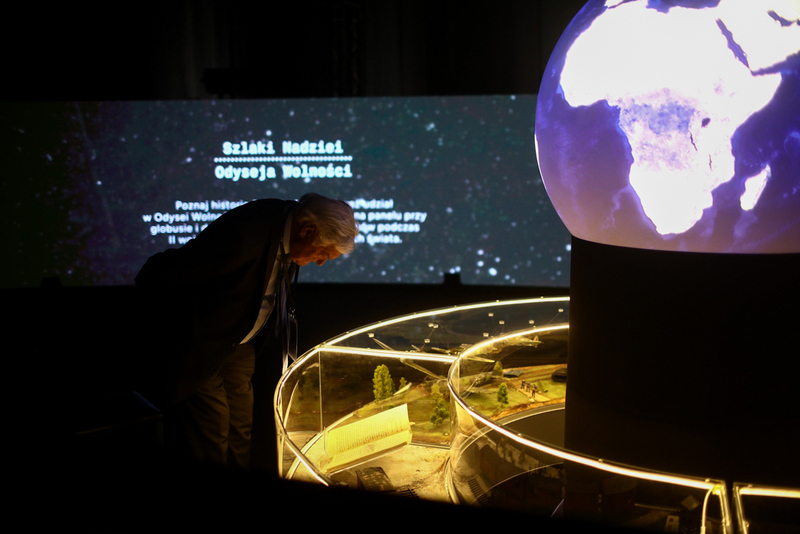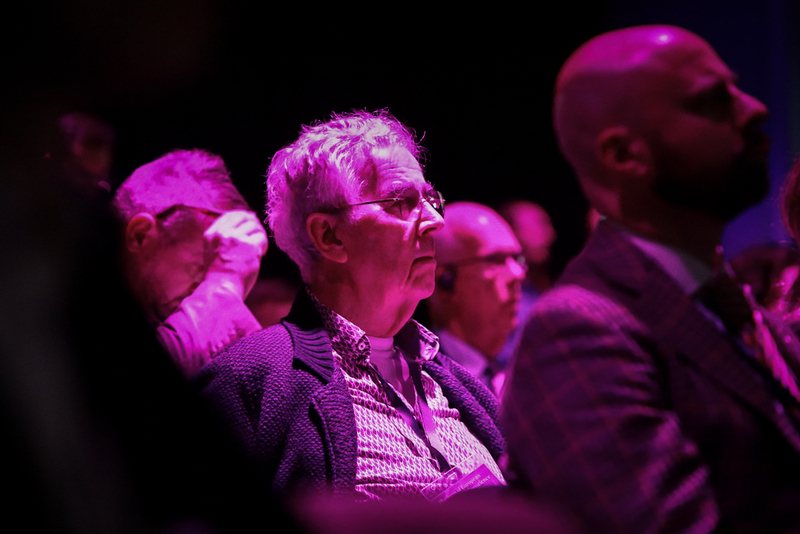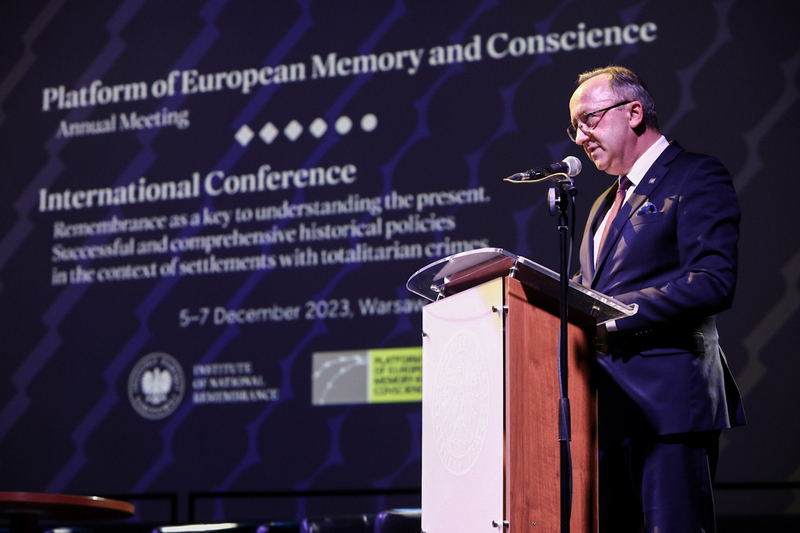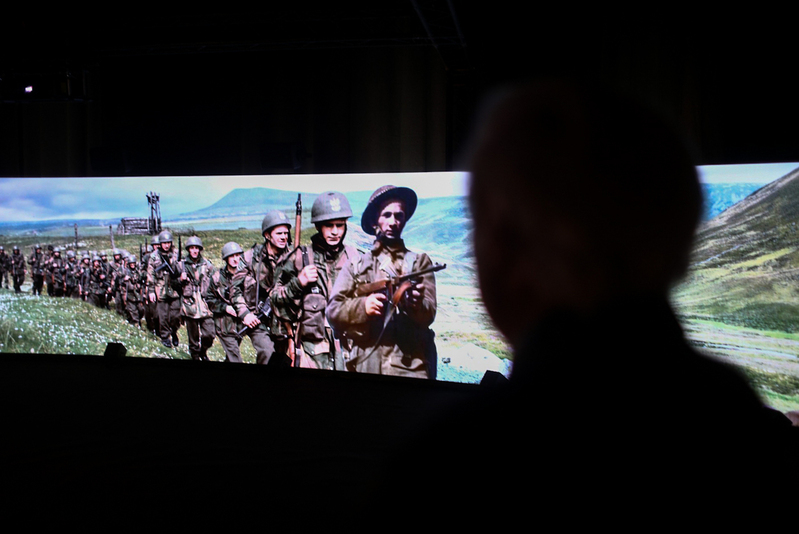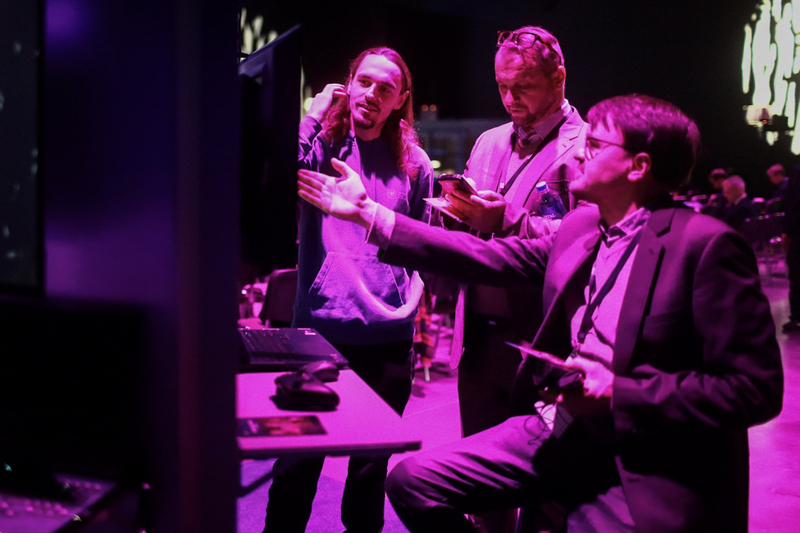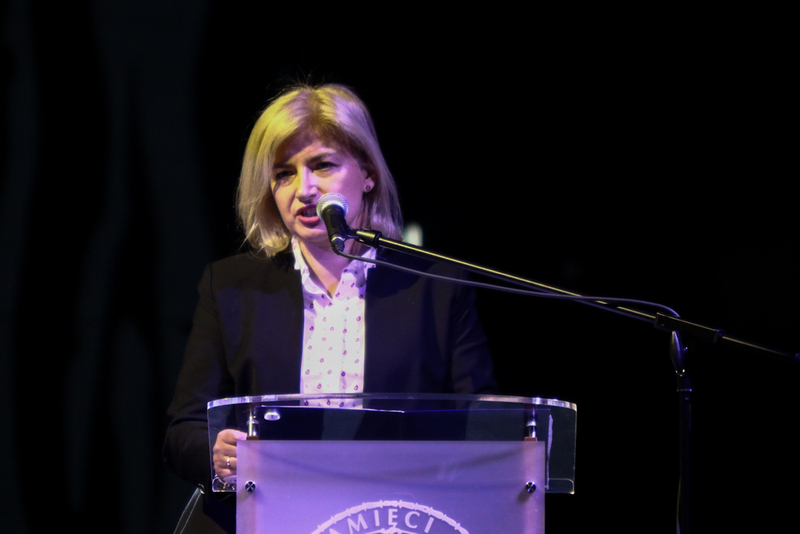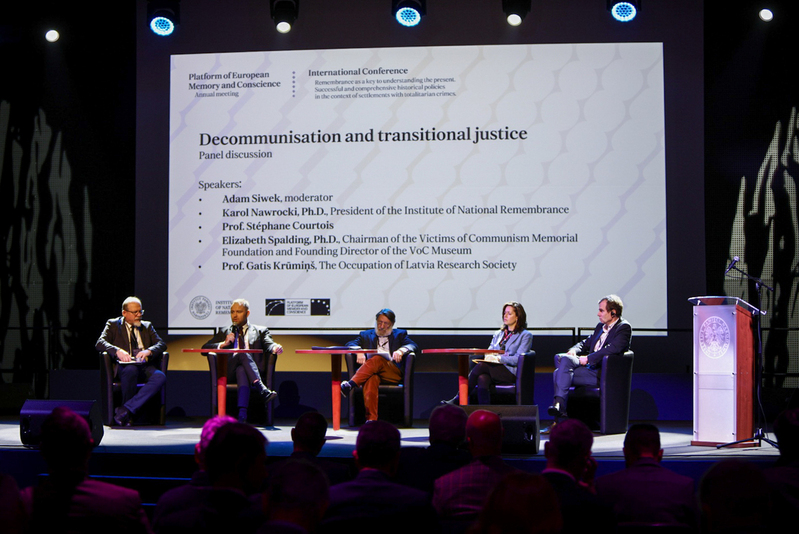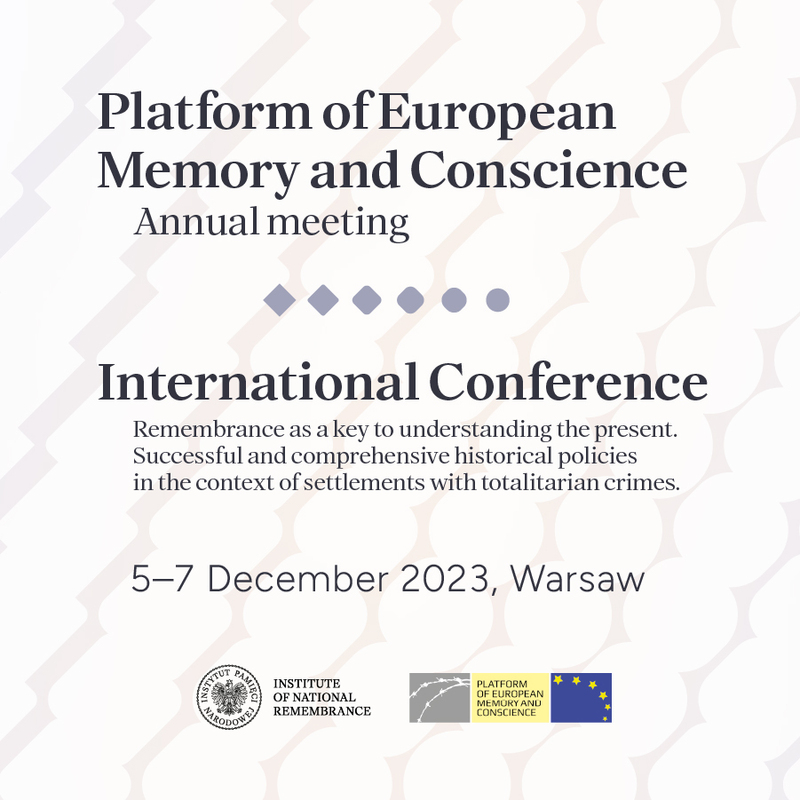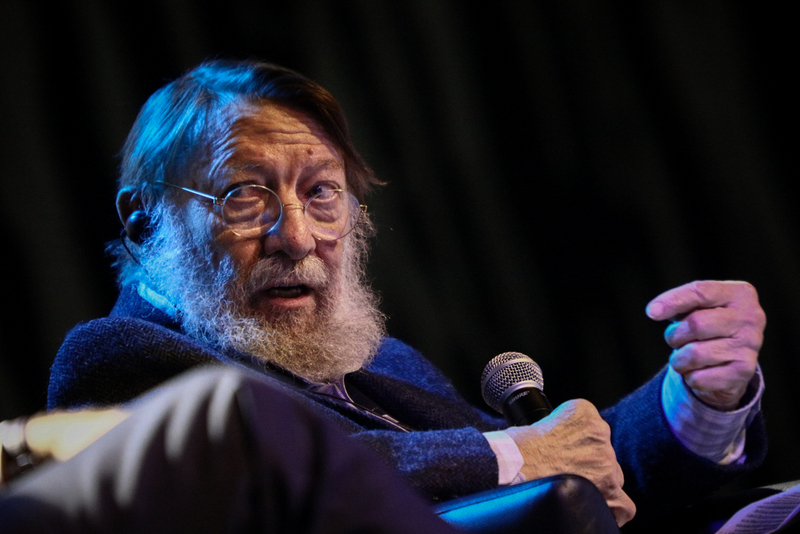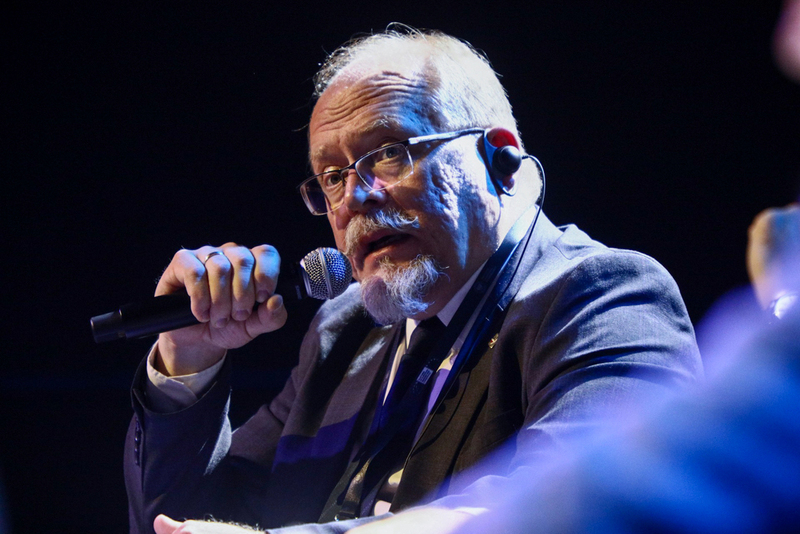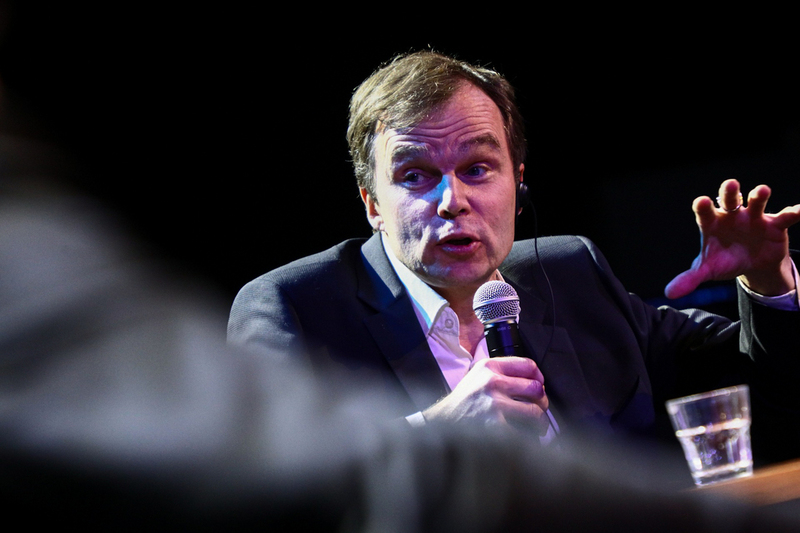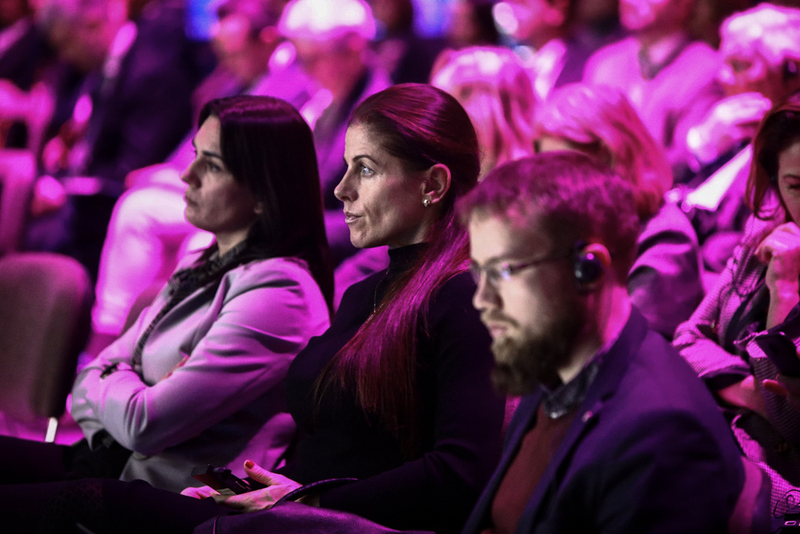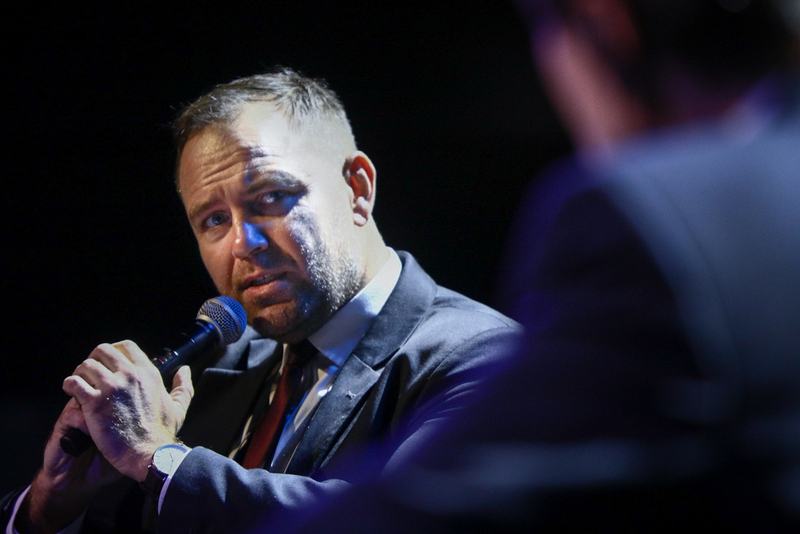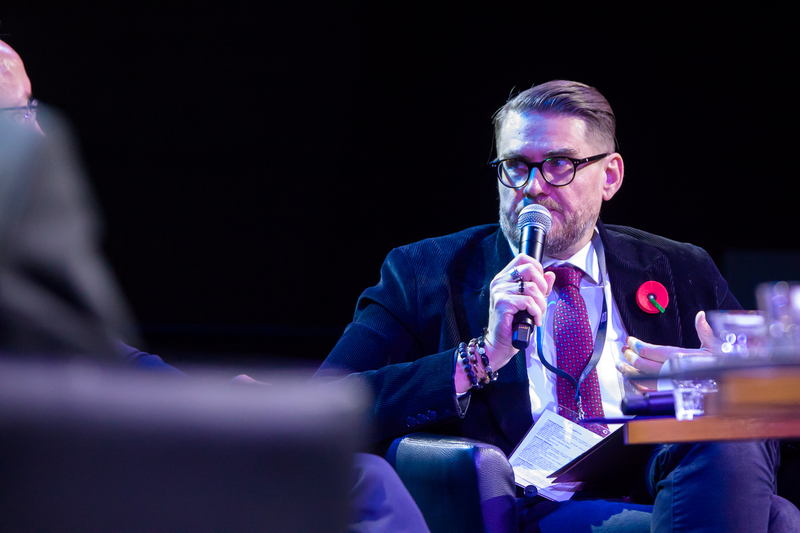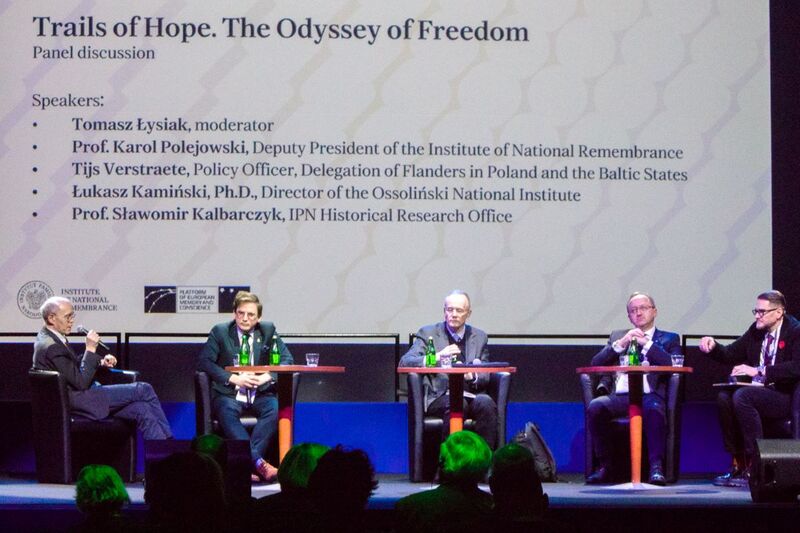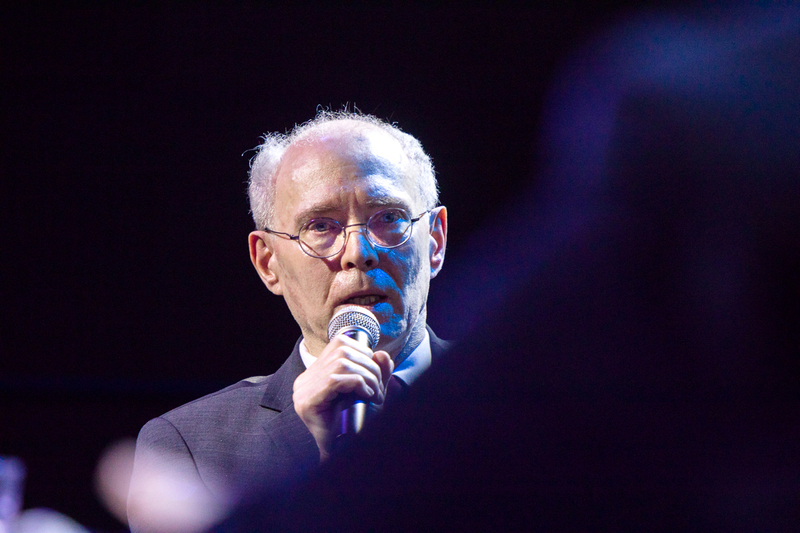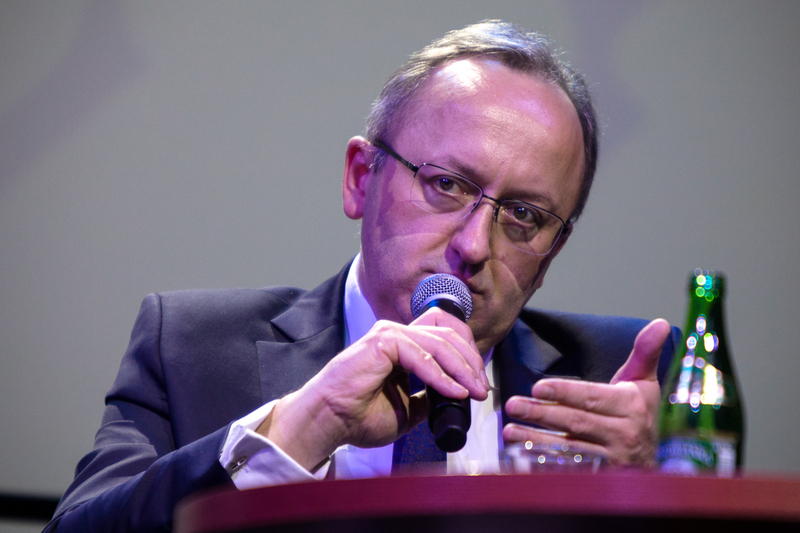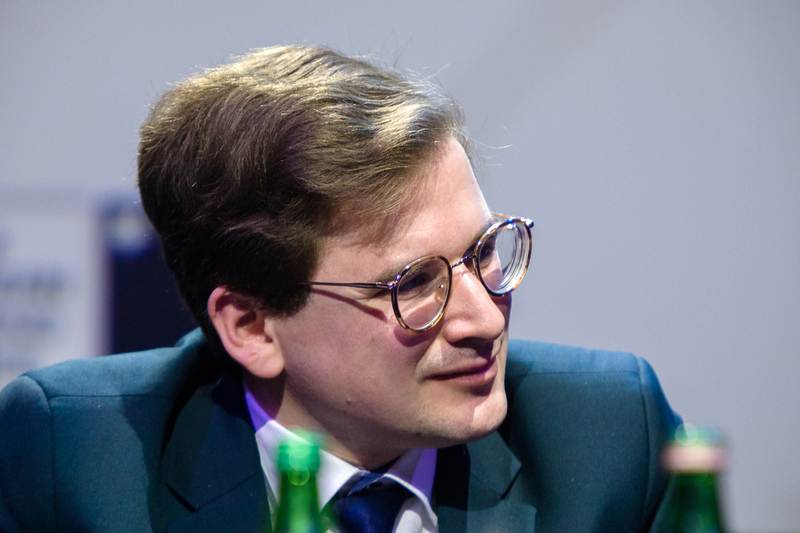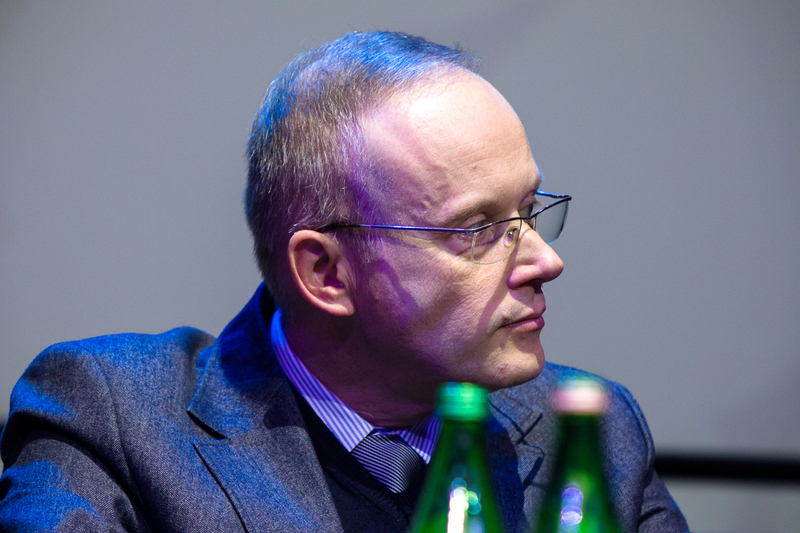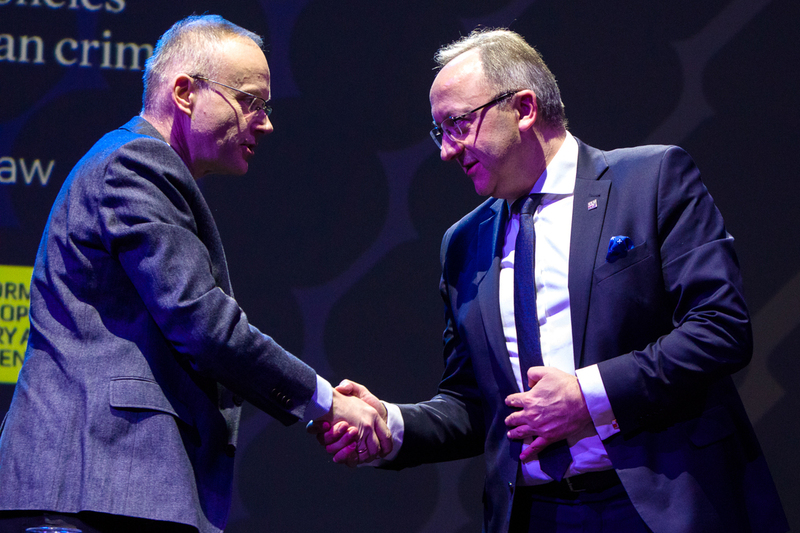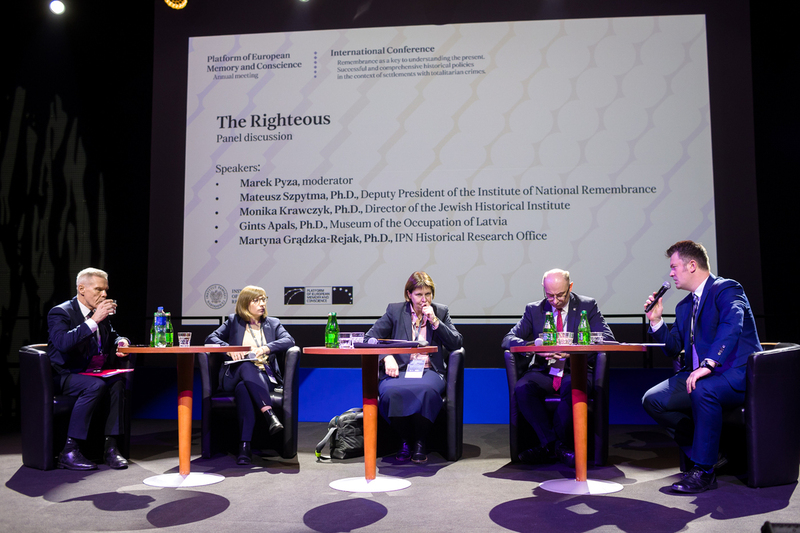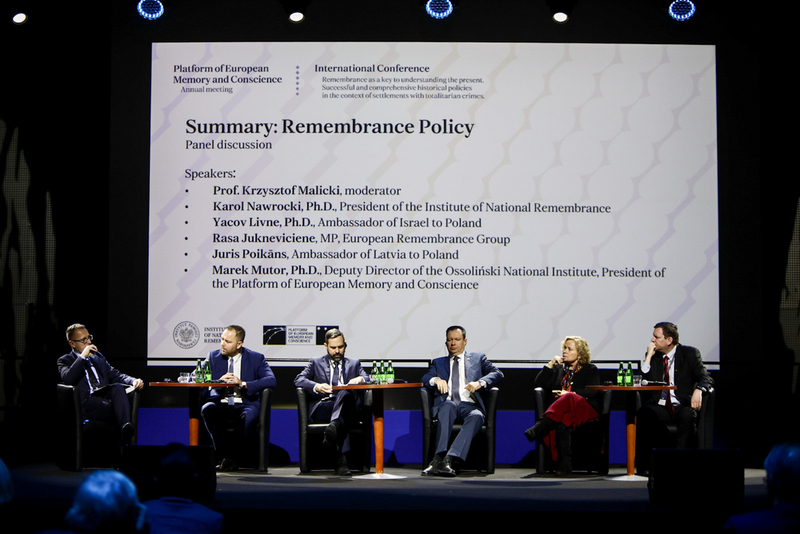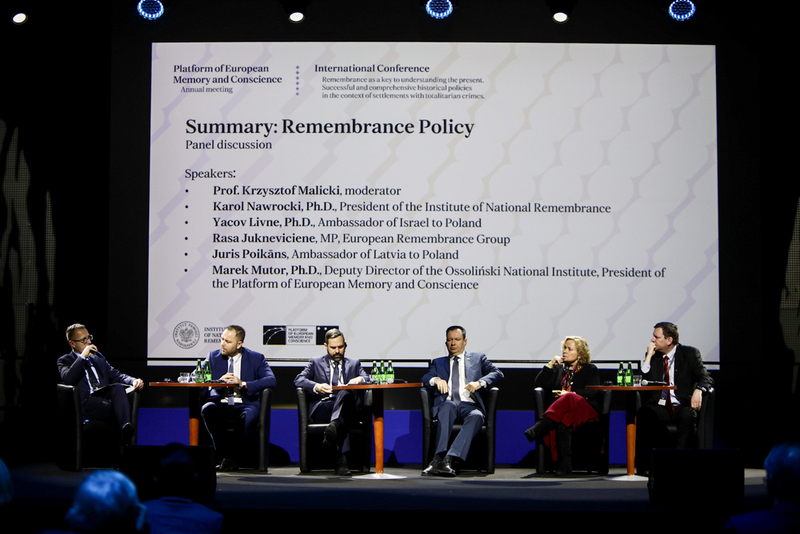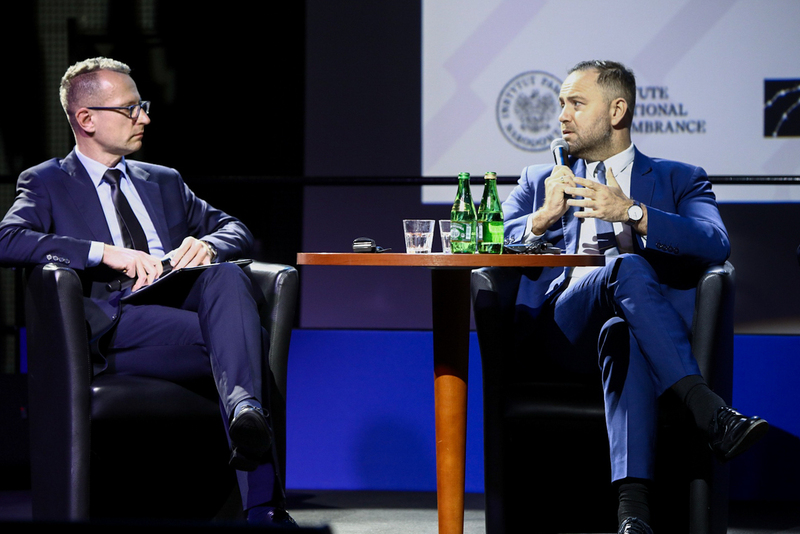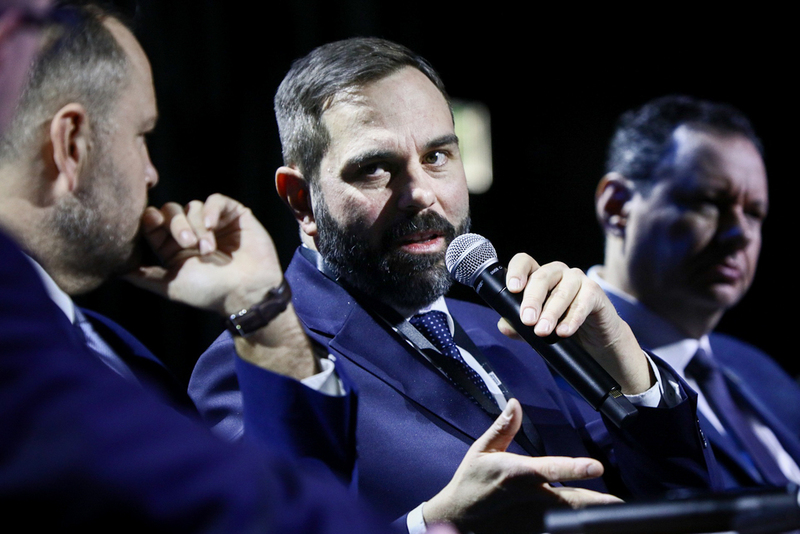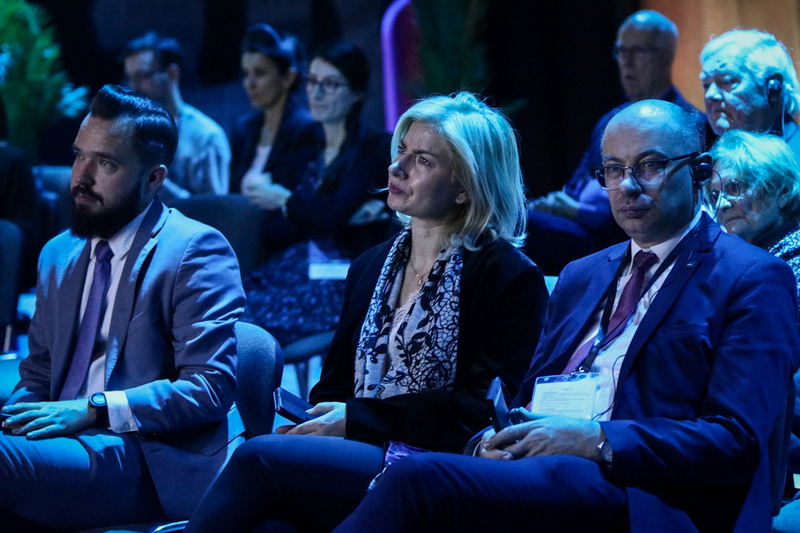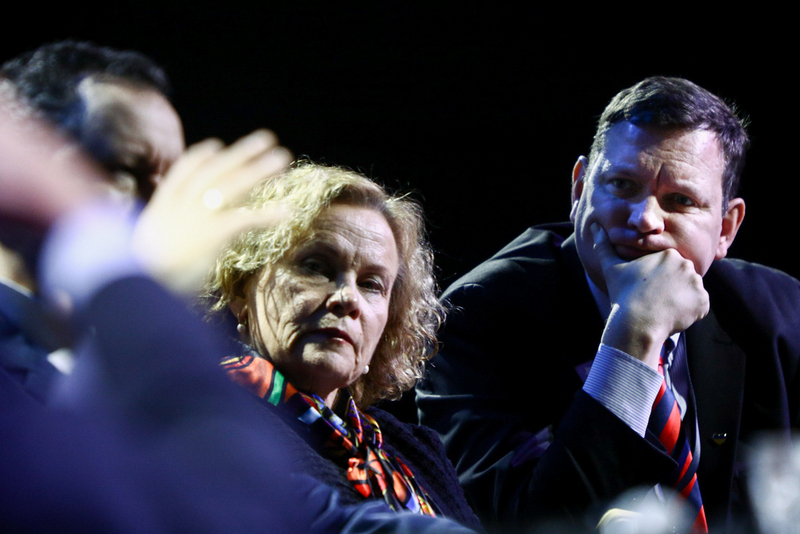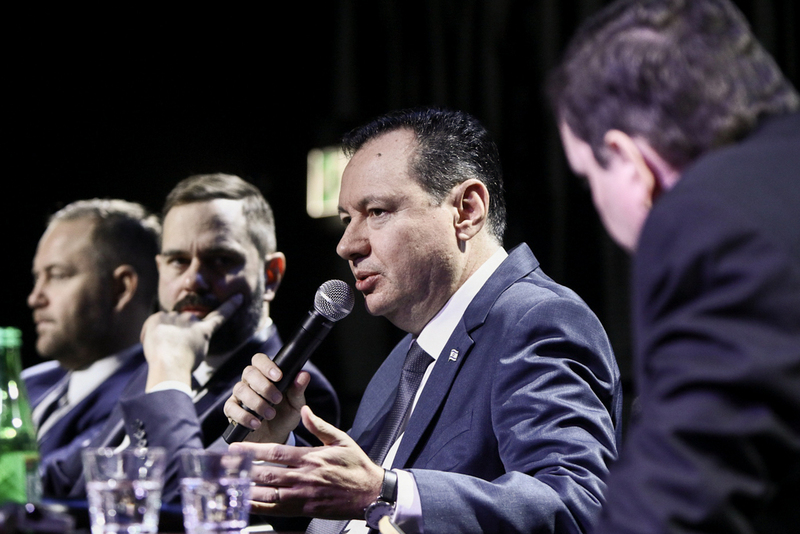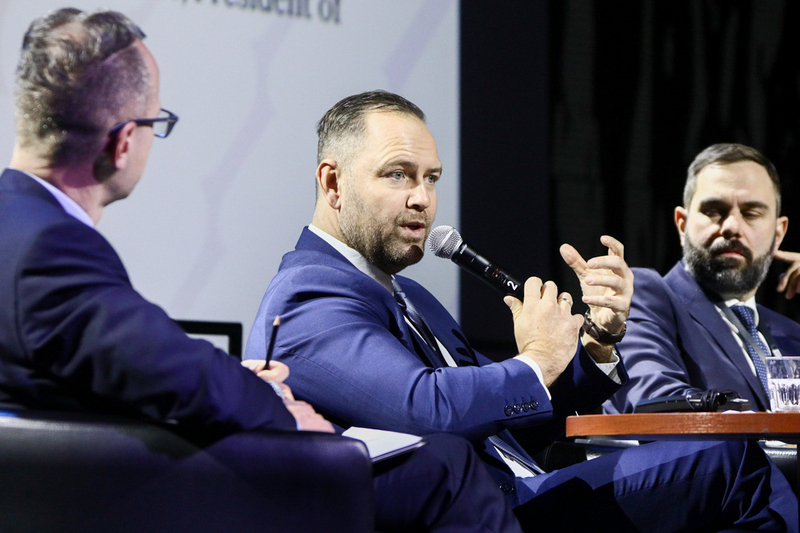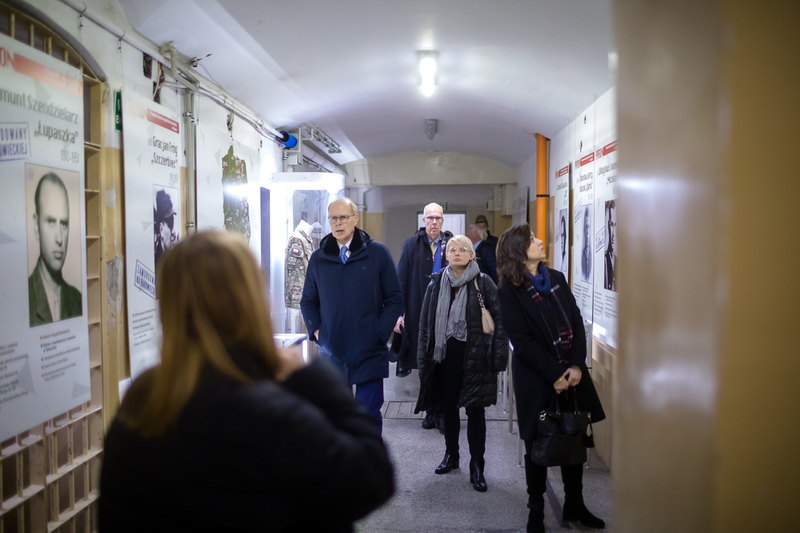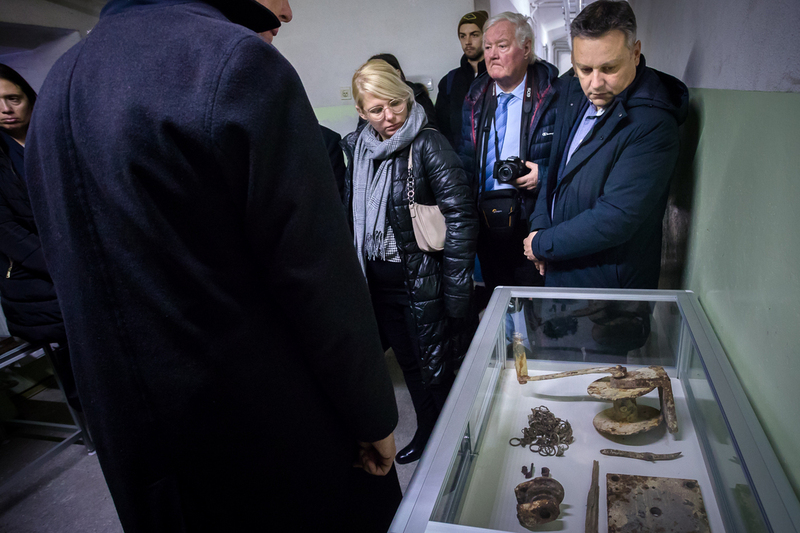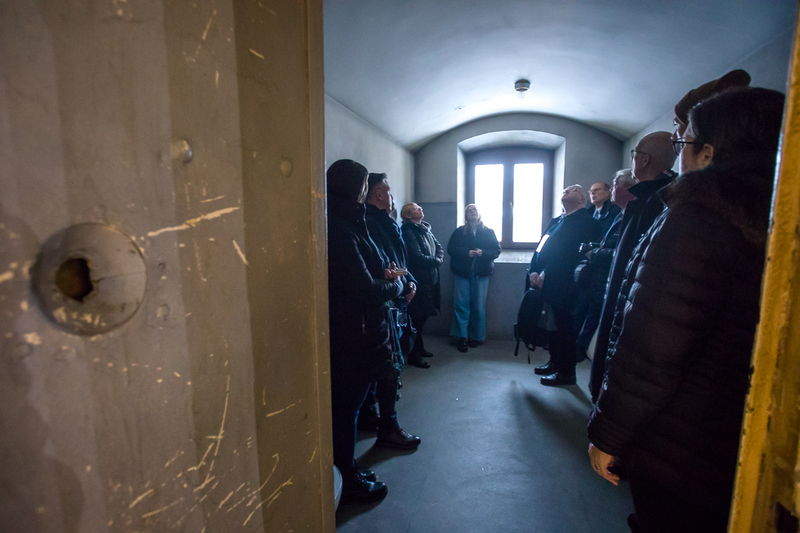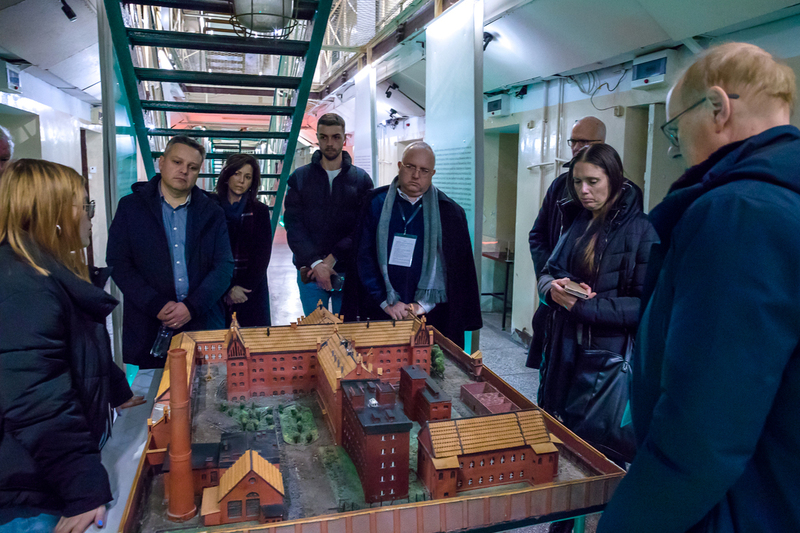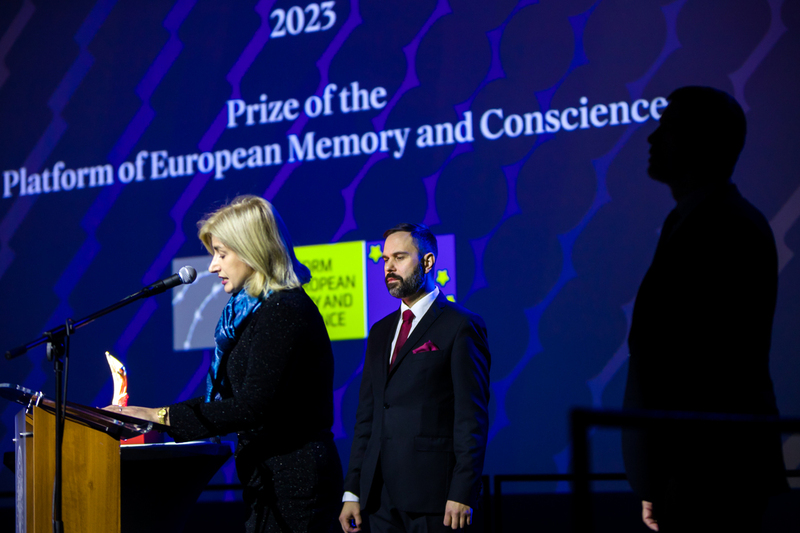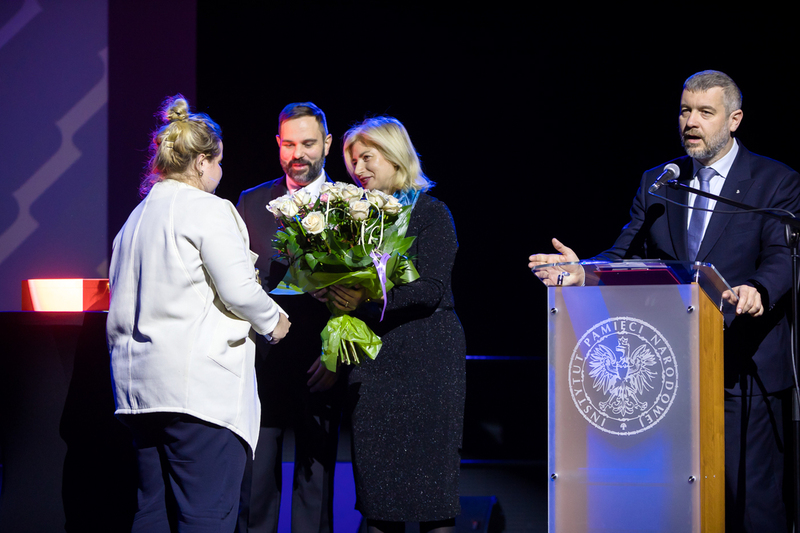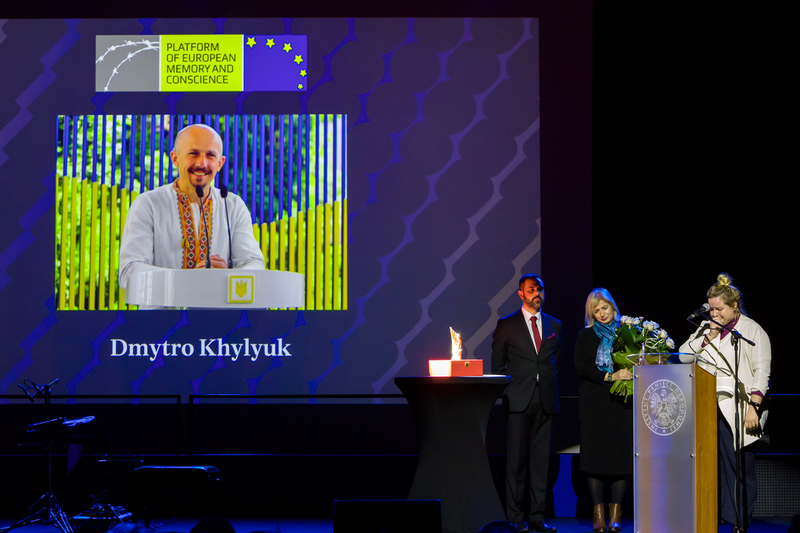The Annual Meeting and Conference of the Platform of European Memory and Conscience took place in Warsaw, Poland, on 5–7 December 2023 at the new headquarters of the Polish Army Museum (Plac Gwardii Pieszej Koronnej).
The Conference title is: “Remembrance as a key to understanding the present. Successful and comprehensive historical policies in the context of settlements with totalitarian crimes”.
During the event, the Platform's annual award was presented. The guests also had an opportunity to see the multimedia version of the IPN exhibition Trails of Hope. The Odyssey of Freedom. This is the first time when the immersive version of the exhibition was visited by such a widely represented international community.
The accompanying academic conference on the politics of remembrance was attended by among others,the IPN President Karol Nawrocki Ph.D., Ambassador of Israel to Poland, Yacov Livne, Ph.D., Elizabeth Spalding, Ph.D., Chairman of the Victims of Communism Memorial Foundation and Founding Director of the VoC Museum in Washington D.C., Prof. Stéphane Courtois, author of the famous Black Book of Communism, and H.E. Juris Poikāns, Ambassador of Latvia to Poland.
PEMC brings together nearly 70 public and private institutions and organizations from 20 countries active in research, documentation, raising awareness and education about the totalitarian regimes that afflicted Europe in the 20th century.
The conference included thematic panels on, among others, decommunization and transitional justice, the IPN's educational and commemorative project Trails of Hope. Odyssey of Freedom, about people who rescued Jews under German occupation during World War II and about the anti-communist underground.
The discussion addressed the remembrance policy in relation to the most significant aspects of the history of totalitarianisms in the 20th century. The selection of these aspects – reflected in the panel’s titles – covered numerous relevant issues discussed in the public debate in Poland. Those issues are also universal and can be viewed in a broader, European context. Taking the Polish experience as a starting point, it seems worth discussing them from other nation’s perspectives. The invited guests searched for answers to the question of to what extent the Polish experience could be valuable for other nations, and for all of Europe. Is there a common canon of memory? What are the similarities, differences and leading disputes regarding the remembrance policy in different countries?
Furthermore, the event included the presentation of the annual award of the Platform for European Memory and Conscience (PEMC). The award is given each year to a person or persons, opposed to totalitarian regimes, working for the ideas of democracy, basic human rights and the rule of law. The Platform's prize is designed to support the nominees, guarantee them protection from persecution and popularize their actions internationally.
The debates were accompanied by an immersive version of the IPN Trails of Hope. The Odyssey of Freedom exhibition. Modern solutions allow us to immerse ourselves in the history of the routes traveled by Poles on land, see and air – civilians and soldiers – during World War II. We can follow their path on an interactive globe, which is the heart of the exhibition. The control panel allows us to select a region of the world and learn about the history and fate of Poles associated with it. The immersive exhibition premiered during the Congress of National Remembrance on 13-15 April 2023 at the PGE National Stadium in Warsaw. It was then showed at the Podkarpackie Congress of National Remembrance on 4-5 October 2023 in Jasionka near Rzeszów. It was created on the basis of materials collected during two years of presenting the traditional board form of the exhibition around the world on 5 continents, including such countries as the Republic of South Africa, Argentina, Iran, Kazakhstan, Canada, Israel, Georgia and Uzbekistan. It recently visited Mexico and the United States. More locations are planned for next year's 80th anniversary of the liberation of European cities from German occupation. The exhibition has been translated into 29 languages, and in every location additional panels depict ties that connect Poles to local communities.
The conference was organized by the IPN's Office of International Cooperation. It also featured a presentation by the IPN's Office of New Technologies. The IPN Office of Cultural Events organized a gala concert within the "Anders Artists" series. The guests had the opportunity to visit the IPN Archive and the Museum of Cursed Soldiers and Political Prisoners of the Polish People's Republic. A visit to the Polish History Museum was also part of the programme.
The first convention day also saw the first panel debate. It focused on decommunization of public space and transitional justice. Moderated by Head of the IPN Office for Commemorating the Struggle and Martyrdom Adam Siwek, it featured President Karol Nawrocki, Chairman of the Victims of Communism Memorial Foundation in Washington Elizabeth Spalding, author of "The Black Book of Communism" Professor Stéphane Courtois and Professor Gatis Krūmiņš of the Occupation of Latvia Research Society.
Panel I: Decommunization of public space and transitional justice
- Adam Siwek, moderator
- Karol Nawrocki Ph.D., President of the Institute of National Remembrance
- Prof. Stéphane Courtois
- Elizabeth Spalding, Ph.D., Founding Director of the Victims of Communism Museum in Washington
- Prof. Gatis Krūmiņšz, The Occupation of Latvia Research Society
The panelists examined the post-communist experiences across the former Eastern Bloc, but also in other countries that replaced authoritarian rule with democracy. The debate was not restricted to Eastern Europe, because while the region suffered communism firsthand, several institutions, communities and individual people in democratic countries were affected by the ideology and used as its willing or unknowing promoters. The panel attempted to identify the challenges of dealing with such promotion and with domestic attacks on decommunization by former regime officers and foreign-sponsored agents of influence.
"I think we all agree that 100 years of communism showed how cruel and murderous the system is . . . Consequently, if communism, neo-communism and all references to the communist ideology are obvious danger, the news of the recreation of communist and national-socialist parties must be treated as a threat to free and democratic world."
The first convention day concluded with the PEMC Council of Members meeting at the Przystanek Historia IPN, in which the delegates voted and discussed membership issues, perspective activities, strategy, plans and resolutions.
The second day of the Platform of European Memory and Conscience annual meeting organized by the IPN in Warsaw started with a panel discussion dedicated to the IPN “Trails of Hope. The Odyssey of Freedom” project.
Panel II: “Trails of Hope. Odyssey of Freedom”
The debate analyzed the evacuation of Poles from the USSR and their subsequent contribution to the victory over the German Reich, the subject matter of the IPN flagship educational project. We delved into the impact of war emigration on the countries of origin and countries of destination, and discussed the work of exiled governments. We inspected Poland’s predicament against the situation of other states that had their territories occupied and authorities exiled, also in the context of post-war political division in Europe which made some returns possible and prevented others.
- Tomasz Łysiak, moderator
- Prof. Karol Polejowski, Deputy President of the Institute of National Remembrance
- Tijs Verstraete, Policy Officer, Delegation of Flanders in Poland and the Baltic States
- Łukasz Kamiński Ph.D., Director of the Ossoliński National Institute
- Prof. Sławomir Kalbarczyk, IPN Historical Research Office
Panel III: “The Righteous”
The second debate covered the topic of “the Righteous” who were not afraid to save people’s lives during WW2. German-occupied Eastern Europe witnessed the extermination of the bulk of European Jews in ghettos, shooting sites, labor and concentration camps, as well as specialized killing facilities run by the Third Reich. Several members of the local societies did not stand by and chose to aid the persecuted minority despite the risks involved, as exemplified by the case of the Ulma family, murdered for defying the anti-Jewish legislation.
Throughout WW2, German-occupied Eastern Europe witnessed the extermination of the bulk of European Jews in ghettos, shooting sites, labor and concentration camps, as well as specialized killing facilities run by the Third Reich. Several members of the local societies did not stand by and chose to aid the persecuted minority despite the risks involved, as exemplified by the case of the Ulma family, murdered for defying the anti-Jewish legislation.
The debate revolved around such issues as the frequency, forms, and outcome of assistance to Jews, support for that assistance at grassroots and legal state level, complex dynamic between helpers and bystanders and correlation between the occupation model and the scale of help and social support to helpers. Special focus was given to the presence of the topic of aid to Jews in historical discourse, as well as recognition of helpers throughout the world in the first years after WW2 and recently.
The panellists:
- Mateusz Szpytma, Ph.D., Deputy President of the Institute of National Remembrance
- Gints Apals Ph.D., Museum of the Occupation of Latvia
- Monika Krawczyk, Ph.D. Director of the Jewish Historical Institute
- Martyna Grądzka- Rejak, Ph.D., IPN Historical Research Office
- Marek Pyza, moderator
The second day of the Platform of European Memory and Conscience Prize convention in Warsaw culminated with the Prize Gala.
Dmytro Khylyuk, UNIAN news agency journalist, was awarded the Platform of European Memory and Conscience Prize, annual recognition of persons and institutions fighting against totalitarian regimes and advocating democracy, human rights and rule of law. The Platform Prize is meant to support laureates in their struggle, help protect them from persecution and secure international publicity for their cause.Dmytro Khylyuk became a journalist in 2005. Having completed postgraduate studies at Taras Shevchenko Kyiv National University, he got a job offer from a news agency, and from day one, loved the profession. He adored the opportunity to expose politicians’ lies, and it still motivates him today: the opportunity to ask tough questions on behalf of the people.In time, he became an expert in several topics – the banking sector, economy in general, politics. He worked as a correspondent for "Context Media," "RBC-Ukraina," "Nezalezhne Biuro Novyn," "ForUm," "News24UA." Since December 2013, he has been a correspondent of the UNIAN Department of News Production. He specializes in investigating courts and law enforcement.
On 3 March 2022, during the Russian army offensive in the Kyiv region, Dmytro Khylyuk was kidnapped, and his official status is civilian hostage. According to international law, such people should be released regardless of POW exchanges, but he hasn’t. International organization Reporters Without Borders found out that Dmytro Khylyuk was held at the Novozybkovsky Pretrial Detention Facility No. 2 in the Bryansk Region in 2022, along with at least 500 other Ukrainians.
The agenda of the last day of the Platform of European Memory and Conscience convention in Warsaw included two more debates.
Panel IV: “Underground/Resistance”
The Polish Underground State, one of the largest resistance movements in German-occupied Europe, was the debate obvious starting point but only part of the big picture. The panelists compared it to underground movements in other countries in terms of political agenda, organization or social support, and discussed how these movements interacted. They explored the similarities and differences against the background of the war in progress, and put them in the context of pre-war history.Another important issue was post-World War II anti-communist resistance in Central and Eastern Europe, taken over by Soviet-sponsored regimes. The debate delved into the ramifications of that takeover, focusing on resistance. The response of the affected nations wasn’t uniform due to political, social and historical reasons, and it is these reasons, as well as the resulting scale, nature and outcome of anti-communist resistance in the region countries that the speakers analyzed. Last but not least, they examined the resistance evolution over the regimes’ life, and tried to assess how much it contributed to ending that life.
Panelists:
- Marcin Wikło, moderator
- Filip Musial, Ph.D. Director of the IPN Branch Office in Cracow
- Toomas Hiio, Estonian Institute of Historical Memory
- Annie Martin, Director of the Museum of Resistance Limoges
- Wojciech Frazik, IPN
Closing “Remembrance Policy”
The last part of the conference was devoted to both summarising the issues discussed beforehand as well as discussing the most critical challenges faced by leaders shaping remembrance policy. Our esteemed guests considered the possibility of shaping an international / European politics of memory based on a common canon of memory. Is it possible? What could be included in the canon? To what extent can the memory of the victims of totalitarian regimes form the basis of the common canon, and to what extent does it still need to be secured?
- Prof. Krzysztof Malicki, moderator
- Karol Nawrocki, Ph.D., President of the Institute of National Remembrance
- Yacov Livne Ph.D., Ambassador of Israel to Poland tbc
- Rasa Jukneviciene, MP, European Remembrance Group
- Juris Poikāns, Ambassador of Latvia to Poland
- Marek Mutor, Ph.D., Deputy Director of the Ossoliński National Institute, President of the Platform of European Memory and Conscience
In the debate, President Karol Nawrocki said,"In modern world, pursuing a remembrance policy is not an opportunity but necessity . . . Understanding and studying our nation’s, our state’s, our own history, which the IPN has been doing for over 20 years, is necessary for discussing our region's’ shared history."The IPN head also gave an example of historical policy that distorts history:"Let’s take, for instance, the word 'Nazis.' It's true there were non-German Nazis in several countries of Western Europe, people who cooperated with Adolf Hitler, and it’s a historical fact. But the word is a product of a historical policy. In 1933, Adolf Hitler won the German elections, and in 1920s, 1930s and in WW2 until Stalingrad, he obviously had support of the German society; obviously, signs on tram cars in occupied Poland did not say 'Nur für Nazis,' only for Nazis, but 'Nur für Deutsche,' only for Germans . . . Yet, many historians, statesmen and media people these days use the word 'Nazi,' which is a result of a historical policy that originated in the 1960s Germany."
The Platform of European Memory and Conscience is a non-profit international non-governmental organisation – an interest association of legal persons founded according to the Civil Code of the Czech Republic. Established on 14 October 2011 in Prague by 20 founding Members from 12 EU Member States, the Platform currently brings together nearly 70 public and private institutions and organisations from 23 countries – 15 EU Member States (Bulgaria, Czech Republic, Estonia, France, Germany, Hungary, Italy, Latvia, Lithuania, Netherlands, Poland, Romania, Slovakia, Slovenia, Sweden), Albania, Canada, Georgia, Iceland, Moldova, Ukraine, the United Kingdom and the United States of America, active in research, documentation, awareness raising and education about the totalitarian regimes which befell Europe in the 20th century.
The establishment of the Platform of European Memory and Conscience was endorsed by the European Parliament and the Council of the European Union.
